An Analysis of Entrepreneurial Ventures, Impact, and Characteristics
VerifiedAdded on 2021/02/19
|15
|4989
|38
Report
AI Summary
This report provides a comprehensive overview of entrepreneurial ventures, exploring different types such as small businesses, large companies, and social enterprises. It delves into the similarities and differences between these ventures, analyzing their purposes, sources of funds, and scales of operation. The report further interprets statistics to demonstrate the impact of micro and small businesses on the economy, highlighting their contributions to employment, GDP, and regional development. It also emphasizes the importance of small businesses and startups in fostering social and economic growth. Additionally, the report identifies the characteristics, traits, and skills of successful entrepreneurs, examining how personality aspects and background experiences influence entrepreneurial motivation and outcomes. The report draws upon a variety of sources to provide a well-rounded understanding of the entrepreneurial landscape.

Entrepreneurship
Paraphrase This Document
Need a fresh take? Get an instant paraphrase of this document with our AI Paraphraser
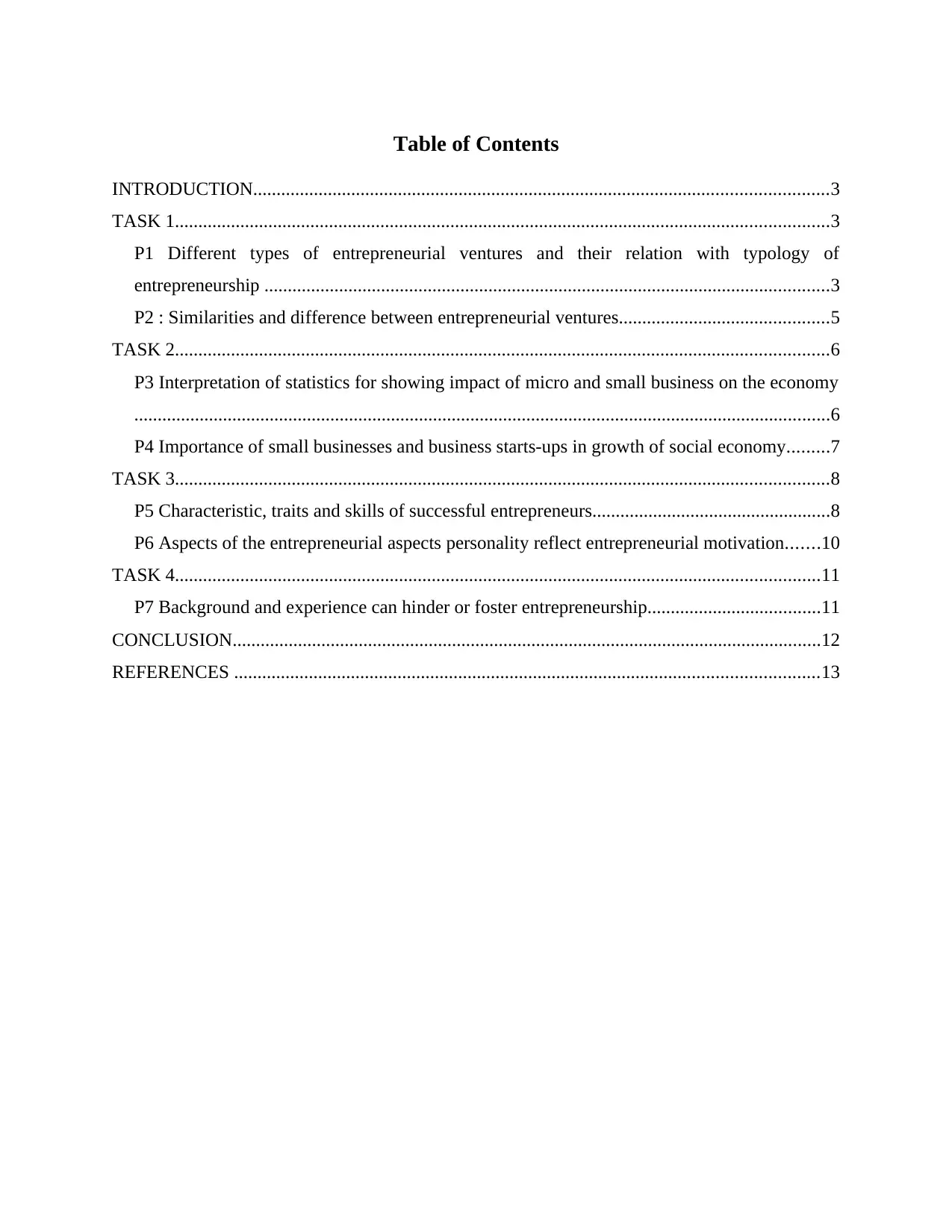
Table of Contents
INTRODUCTION...........................................................................................................................3
TASK 1............................................................................................................................................3
P1 Different types of entrepreneurial ventures and their relation with typology of
entrepreneurship .........................................................................................................................3
P2 : Similarities and difference between entrepreneurial ventures.............................................5
TASK 2............................................................................................................................................6
P3 Interpretation of statistics for showing impact of micro and small business on the economy
.....................................................................................................................................................6
P4 Importance of small businesses and business starts-ups in growth of social economy.........7
TASK 3............................................................................................................................................8
P5 Characteristic, traits and skills of successful entrepreneurs...................................................8
P6 Aspects of the entrepreneurial aspects personality reflect entrepreneurial motivation.......10
TASK 4..........................................................................................................................................11
P7 Background and experience can hinder or foster entrepreneurship.....................................11
CONCLUSION..............................................................................................................................12
REFERENCES .............................................................................................................................13
INTRODUCTION...........................................................................................................................3
TASK 1............................................................................................................................................3
P1 Different types of entrepreneurial ventures and their relation with typology of
entrepreneurship .........................................................................................................................3
P2 : Similarities and difference between entrepreneurial ventures.............................................5
TASK 2............................................................................................................................................6
P3 Interpretation of statistics for showing impact of micro and small business on the economy
.....................................................................................................................................................6
P4 Importance of small businesses and business starts-ups in growth of social economy.........7
TASK 3............................................................................................................................................8
P5 Characteristic, traits and skills of successful entrepreneurs...................................................8
P6 Aspects of the entrepreneurial aspects personality reflect entrepreneurial motivation.......10
TASK 4..........................................................................................................................................11
P7 Background and experience can hinder or foster entrepreneurship.....................................11
CONCLUSION..............................................................................................................................12
REFERENCES .............................................................................................................................13
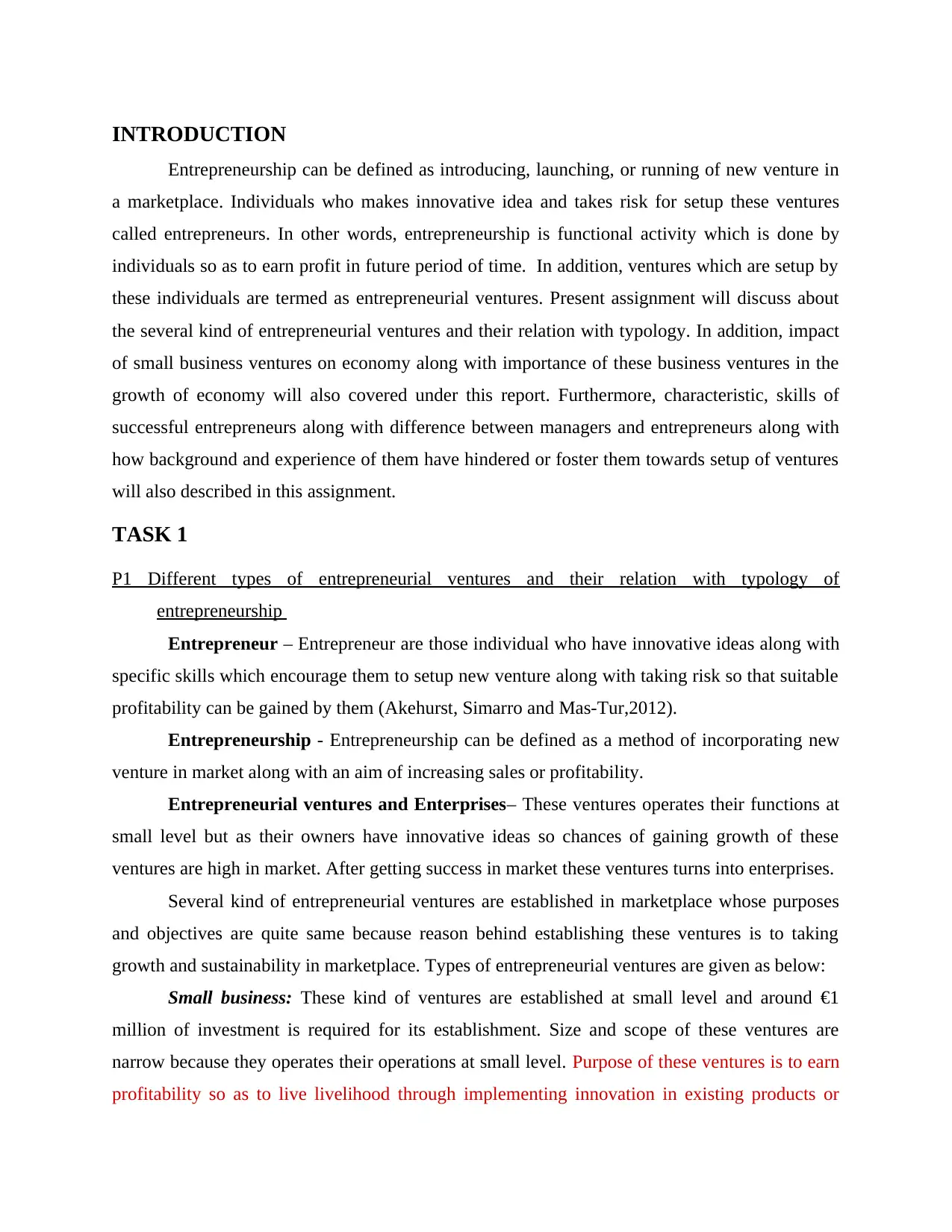
INTRODUCTION
Entrepreneurship can be defined as introducing, launching, or running of new venture in
a marketplace. Individuals who makes innovative idea and takes risk for setup these ventures
called entrepreneurs. In other words, entrepreneurship is functional activity which is done by
individuals so as to earn profit in future period of time. In addition, ventures which are setup by
these individuals are termed as entrepreneurial ventures. Present assignment will discuss about
the several kind of entrepreneurial ventures and their relation with typology. In addition, impact
of small business ventures on economy along with importance of these business ventures in the
growth of economy will also covered under this report. Furthermore, characteristic, skills of
successful entrepreneurs along with difference between managers and entrepreneurs along with
how background and experience of them have hindered or foster them towards setup of ventures
will also described in this assignment.
TASK 1
P1 Different types of entrepreneurial ventures and their relation with typology of
entrepreneurship
Entrepreneur – Entrepreneur are those individual who have innovative ideas along with
specific skills which encourage them to setup new venture along with taking risk so that suitable
profitability can be gained by them (Akehurst, Simarro and Mas‐Tur,2012).
Entrepreneurship - Entrepreneurship can be defined as a method of incorporating new
venture in market along with an aim of increasing sales or profitability.
Entrepreneurial ventures and Enterprises– These ventures operates their functions at
small level but as their owners have innovative ideas so chances of gaining growth of these
ventures are high in market. After getting success in market these ventures turns into enterprises.
Several kind of entrepreneurial ventures are established in marketplace whose purposes
and objectives are quite same because reason behind establishing these ventures is to taking
growth and sustainability in marketplace. Types of entrepreneurial ventures are given as below:
Small business: These kind of ventures are established at small level and around €1
million of investment is required for its establishment. Size and scope of these ventures are
narrow because they operates their operations at small level. Purpose of these ventures is to earn
profitability so as to live livelihood through implementing innovation in existing products or
Entrepreneurship can be defined as introducing, launching, or running of new venture in
a marketplace. Individuals who makes innovative idea and takes risk for setup these ventures
called entrepreneurs. In other words, entrepreneurship is functional activity which is done by
individuals so as to earn profit in future period of time. In addition, ventures which are setup by
these individuals are termed as entrepreneurial ventures. Present assignment will discuss about
the several kind of entrepreneurial ventures and their relation with typology. In addition, impact
of small business ventures on economy along with importance of these business ventures in the
growth of economy will also covered under this report. Furthermore, characteristic, skills of
successful entrepreneurs along with difference between managers and entrepreneurs along with
how background and experience of them have hindered or foster them towards setup of ventures
will also described in this assignment.
TASK 1
P1 Different types of entrepreneurial ventures and their relation with typology of
entrepreneurship
Entrepreneur – Entrepreneur are those individual who have innovative ideas along with
specific skills which encourage them to setup new venture along with taking risk so that suitable
profitability can be gained by them (Akehurst, Simarro and Mas‐Tur,2012).
Entrepreneurship - Entrepreneurship can be defined as a method of incorporating new
venture in market along with an aim of increasing sales or profitability.
Entrepreneurial ventures and Enterprises– These ventures operates their functions at
small level but as their owners have innovative ideas so chances of gaining growth of these
ventures are high in market. After getting success in market these ventures turns into enterprises.
Several kind of entrepreneurial ventures are established in marketplace whose purposes
and objectives are quite same because reason behind establishing these ventures is to taking
growth and sustainability in marketplace. Types of entrepreneurial ventures are given as below:
Small business: These kind of ventures are established at small level and around €1
million of investment is required for its establishment. Size and scope of these ventures are
narrow because they operates their operations at small level. Purpose of these ventures is to earn
profitability so as to live livelihood through implementing innovation in existing products or
⊘ This is a preview!⊘
Do you want full access?
Subscribe today to unlock all pages.

Trusted by 1+ million students worldwide
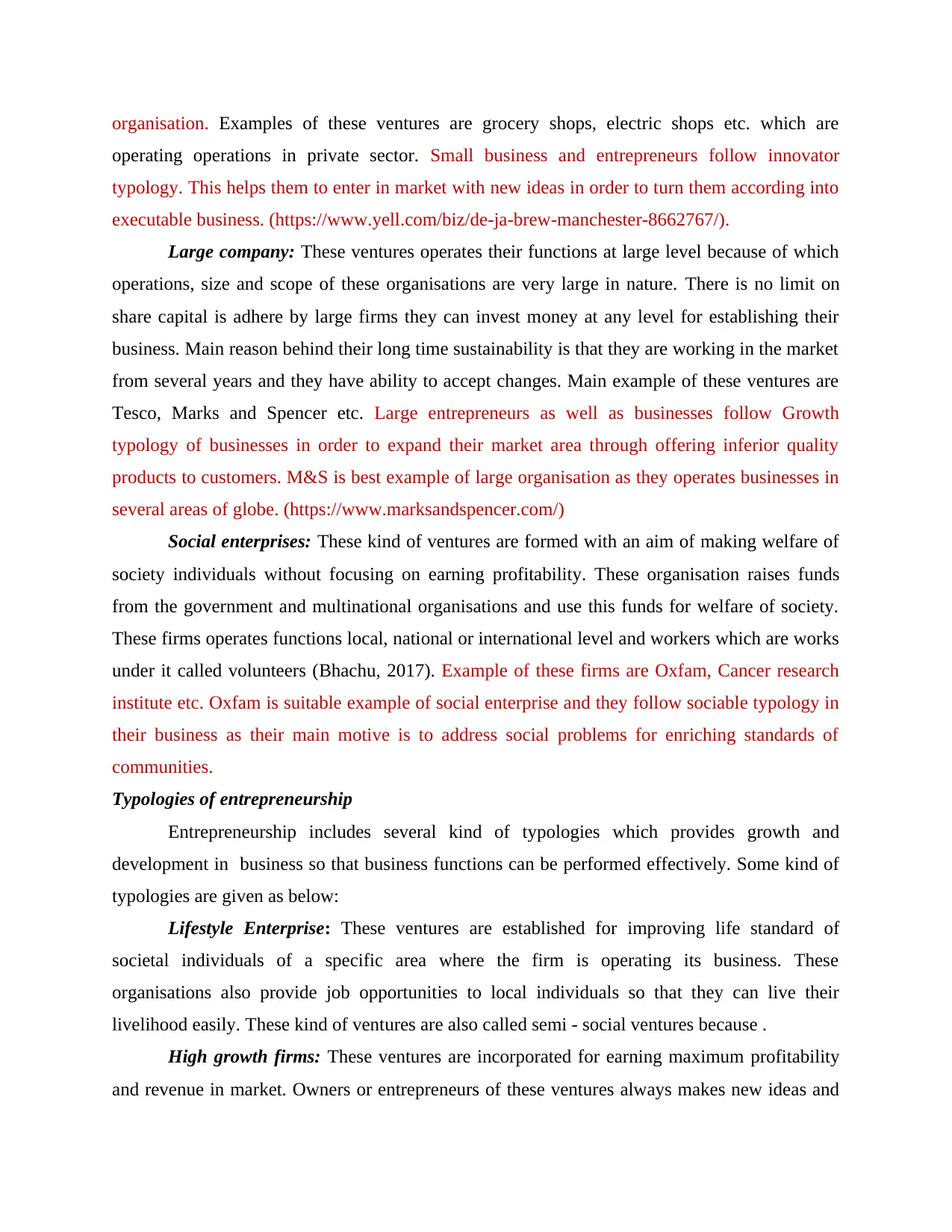
organisation. Examples of these ventures are grocery shops, electric shops etc. which are
operating operations in private sector. Small business and entrepreneurs follow innovator
typology. This helps them to enter in market with new ideas in order to turn them according into
executable business. (https://www.yell.com/biz/de-ja-brew-manchester-8662767/).
Large company: These ventures operates their functions at large level because of which
operations, size and scope of these organisations are very large in nature. There is no limit on
share capital is adhere by large firms they can invest money at any level for establishing their
business. Main reason behind their long time sustainability is that they are working in the market
from several years and they have ability to accept changes. Main example of these ventures are
Tesco, Marks and Spencer etc. Large entrepreneurs as well as businesses follow Growth
typology of businesses in order to expand their market area through offering inferior quality
products to customers. M&S is best example of large organisation as they operates businesses in
several areas of globe. (https://www.marksandspencer.com/)
Social enterprises: These kind of ventures are formed with an aim of making welfare of
society individuals without focusing on earning profitability. These organisation raises funds
from the government and multinational organisations and use this funds for welfare of society.
These firms operates functions local, national or international level and workers which are works
under it called volunteers (Bhachu, 2017). Example of these firms are Oxfam, Cancer research
institute etc. Oxfam is suitable example of social enterprise and they follow sociable typology in
their business as their main motive is to address social problems for enriching standards of
communities.
Typologies of entrepreneurship
Entrepreneurship includes several kind of typologies which provides growth and
development in business so that business functions can be performed effectively. Some kind of
typologies are given as below:
Lifestyle Enterprise: These ventures are established for improving life standard of
societal individuals of a specific area where the firm is operating its business. These
organisations also provide job opportunities to local individuals so that they can live their
livelihood easily. These kind of ventures are also called semi - social ventures because .
High growth firms: These ventures are incorporated for earning maximum profitability
and revenue in market. Owners or entrepreneurs of these ventures always makes new ideas and
operating operations in private sector. Small business and entrepreneurs follow innovator
typology. This helps them to enter in market with new ideas in order to turn them according into
executable business. (https://www.yell.com/biz/de-ja-brew-manchester-8662767/).
Large company: These ventures operates their functions at large level because of which
operations, size and scope of these organisations are very large in nature. There is no limit on
share capital is adhere by large firms they can invest money at any level for establishing their
business. Main reason behind their long time sustainability is that they are working in the market
from several years and they have ability to accept changes. Main example of these ventures are
Tesco, Marks and Spencer etc. Large entrepreneurs as well as businesses follow Growth
typology of businesses in order to expand their market area through offering inferior quality
products to customers. M&S is best example of large organisation as they operates businesses in
several areas of globe. (https://www.marksandspencer.com/)
Social enterprises: These kind of ventures are formed with an aim of making welfare of
society individuals without focusing on earning profitability. These organisation raises funds
from the government and multinational organisations and use this funds for welfare of society.
These firms operates functions local, national or international level and workers which are works
under it called volunteers (Bhachu, 2017). Example of these firms are Oxfam, Cancer research
institute etc. Oxfam is suitable example of social enterprise and they follow sociable typology in
their business as their main motive is to address social problems for enriching standards of
communities.
Typologies of entrepreneurship
Entrepreneurship includes several kind of typologies which provides growth and
development in business so that business functions can be performed effectively. Some kind of
typologies are given as below:
Lifestyle Enterprise: These ventures are established for improving life standard of
societal individuals of a specific area where the firm is operating its business. These
organisations also provide job opportunities to local individuals so that they can live their
livelihood easily. These kind of ventures are also called semi - social ventures because .
High growth firms: These ventures are incorporated for earning maximum profitability
and revenue in market. Owners or entrepreneurs of these ventures always makes new ideas and
Paraphrase This Document
Need a fresh take? Get an instant paraphrase of this document with our AI Paraphraser
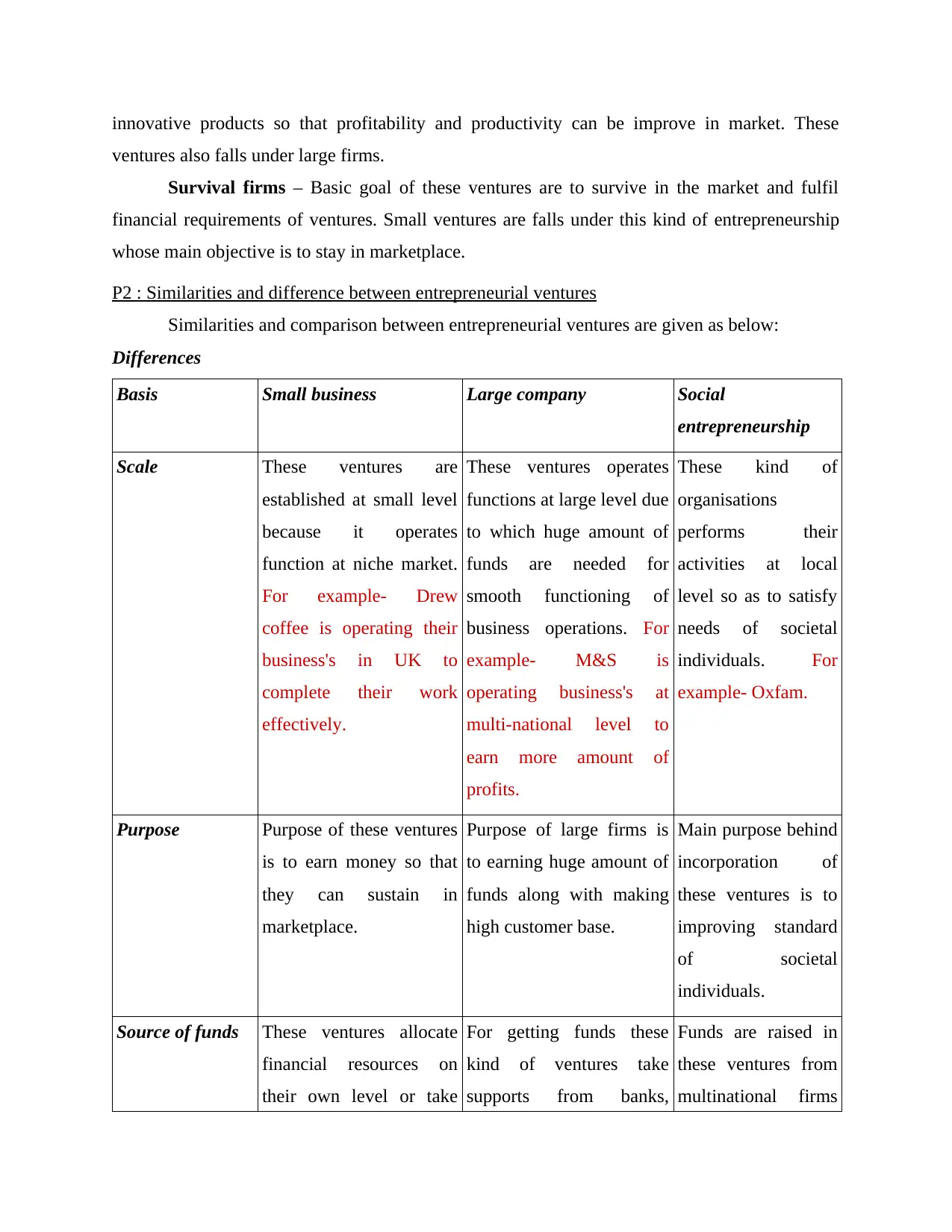
innovative products so that profitability and productivity can be improve in market. These
ventures also falls under large firms.
Survival firms – Basic goal of these ventures are to survive in the market and fulfil
financial requirements of ventures. Small ventures are falls under this kind of entrepreneurship
whose main objective is to stay in marketplace.
P2 : Similarities and difference between entrepreneurial ventures
Similarities and comparison between entrepreneurial ventures are given as below:
Differences
Basis Small business Large company Social
entrepreneurship
Scale These ventures are
established at small level
because it operates
function at niche market.
For example- Drew
coffee is operating their
business's in UK to
complete their work
effectively.
These ventures operates
functions at large level due
to which huge amount of
funds are needed for
smooth functioning of
business operations. For
example- M&S is
operating business's at
multi-national level to
earn more amount of
profits.
These kind of
organisations
performs their
activities at local
level so as to satisfy
needs of societal
individuals. For
example- Oxfam.
Purpose Purpose of these ventures
is to earn money so that
they can sustain in
marketplace.
Purpose of large firms is
to earning huge amount of
funds along with making
high customer base.
Main purpose behind
incorporation of
these ventures is to
improving standard
of societal
individuals.
Source of funds These ventures allocate
financial resources on
their own level or take
For getting funds these
kind of ventures take
supports from banks,
Funds are raised in
these ventures from
multinational firms
ventures also falls under large firms.
Survival firms – Basic goal of these ventures are to survive in the market and fulfil
financial requirements of ventures. Small ventures are falls under this kind of entrepreneurship
whose main objective is to stay in marketplace.
P2 : Similarities and difference between entrepreneurial ventures
Similarities and comparison between entrepreneurial ventures are given as below:
Differences
Basis Small business Large company Social
entrepreneurship
Scale These ventures are
established at small level
because it operates
function at niche market.
For example- Drew
coffee is operating their
business's in UK to
complete their work
effectively.
These ventures operates
functions at large level due
to which huge amount of
funds are needed for
smooth functioning of
business operations. For
example- M&S is
operating business's at
multi-national level to
earn more amount of
profits.
These kind of
organisations
performs their
activities at local
level so as to satisfy
needs of societal
individuals. For
example- Oxfam.
Purpose Purpose of these ventures
is to earn money so that
they can sustain in
marketplace.
Purpose of large firms is
to earning huge amount of
funds along with making
high customer base.
Main purpose behind
incorporation of
these ventures is to
improving standard
of societal
individuals.
Source of funds These ventures allocate
financial resources on
their own level or take
For getting funds these
kind of ventures take
supports from banks,
Funds are raised in
these ventures from
multinational firms
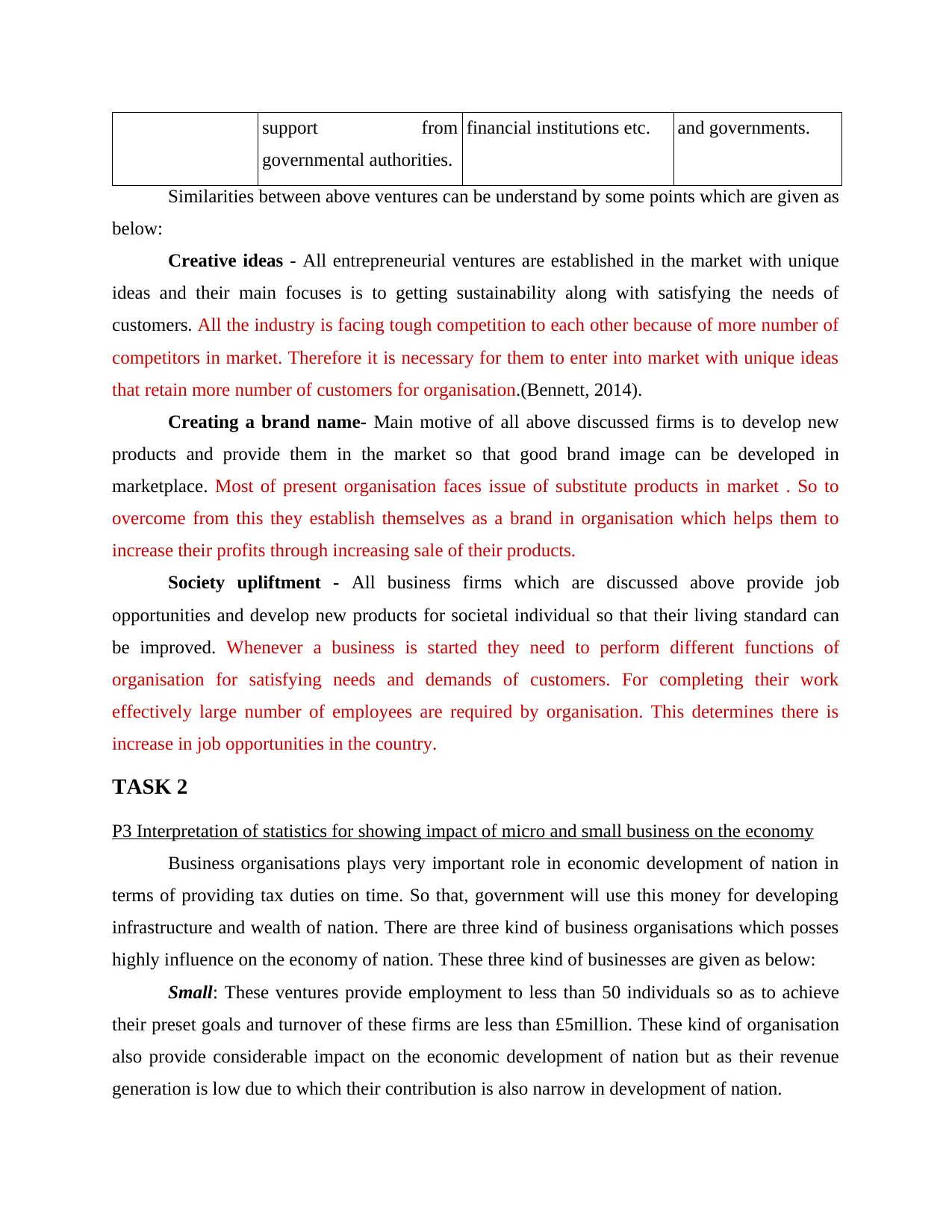
support from
governmental authorities.
financial institutions etc. and governments.
Similarities between above ventures can be understand by some points which are given as
below:
Creative ideas - All entrepreneurial ventures are established in the market with unique
ideas and their main focuses is to getting sustainability along with satisfying the needs of
customers. All the industry is facing tough competition to each other because of more number of
competitors in market. Therefore it is necessary for them to enter into market with unique ideas
that retain more number of customers for organisation.(Bennett, 2014).
Creating a brand name- Main motive of all above discussed firms is to develop new
products and provide them in the market so that good brand image can be developed in
marketplace. Most of present organisation faces issue of substitute products in market . So to
overcome from this they establish themselves as a brand in organisation which helps them to
increase their profits through increasing sale of their products.
Society upliftment - All business firms which are discussed above provide job
opportunities and develop new products for societal individual so that their living standard can
be improved. Whenever a business is started they need to perform different functions of
organisation for satisfying needs and demands of customers. For completing their work
effectively large number of employees are required by organisation. This determines there is
increase in job opportunities in the country.
TASK 2
P3 Interpretation of statistics for showing impact of micro and small business on the economy
Business organisations plays very important role in economic development of nation in
terms of providing tax duties on time. So that, government will use this money for developing
infrastructure and wealth of nation. There are three kind of business organisations which posses
highly influence on the economy of nation. These three kind of businesses are given as below:
Small: These ventures provide employment to less than 50 individuals so as to achieve
their preset goals and turnover of these firms are less than £5million. These kind of organisation
also provide considerable impact on the economic development of nation but as their revenue
generation is low due to which their contribution is also narrow in development of nation.
governmental authorities.
financial institutions etc. and governments.
Similarities between above ventures can be understand by some points which are given as
below:
Creative ideas - All entrepreneurial ventures are established in the market with unique
ideas and their main focuses is to getting sustainability along with satisfying the needs of
customers. All the industry is facing tough competition to each other because of more number of
competitors in market. Therefore it is necessary for them to enter into market with unique ideas
that retain more number of customers for organisation.(Bennett, 2014).
Creating a brand name- Main motive of all above discussed firms is to develop new
products and provide them in the market so that good brand image can be developed in
marketplace. Most of present organisation faces issue of substitute products in market . So to
overcome from this they establish themselves as a brand in organisation which helps them to
increase their profits through increasing sale of their products.
Society upliftment - All business firms which are discussed above provide job
opportunities and develop new products for societal individual so that their living standard can
be improved. Whenever a business is started they need to perform different functions of
organisation for satisfying needs and demands of customers. For completing their work
effectively large number of employees are required by organisation. This determines there is
increase in job opportunities in the country.
TASK 2
P3 Interpretation of statistics for showing impact of micro and small business on the economy
Business organisations plays very important role in economic development of nation in
terms of providing tax duties on time. So that, government will use this money for developing
infrastructure and wealth of nation. There are three kind of business organisations which posses
highly influence on the economy of nation. These three kind of businesses are given as below:
Small: These ventures provide employment to less than 50 individuals so as to achieve
their preset goals and turnover of these firms are less than £5million. These kind of organisation
also provide considerable impact on the economic development of nation but as their revenue
generation is low due to which their contribution is also narrow in development of nation.
⊘ This is a preview!⊘
Do you want full access?
Subscribe today to unlock all pages.

Trusted by 1+ million students worldwide
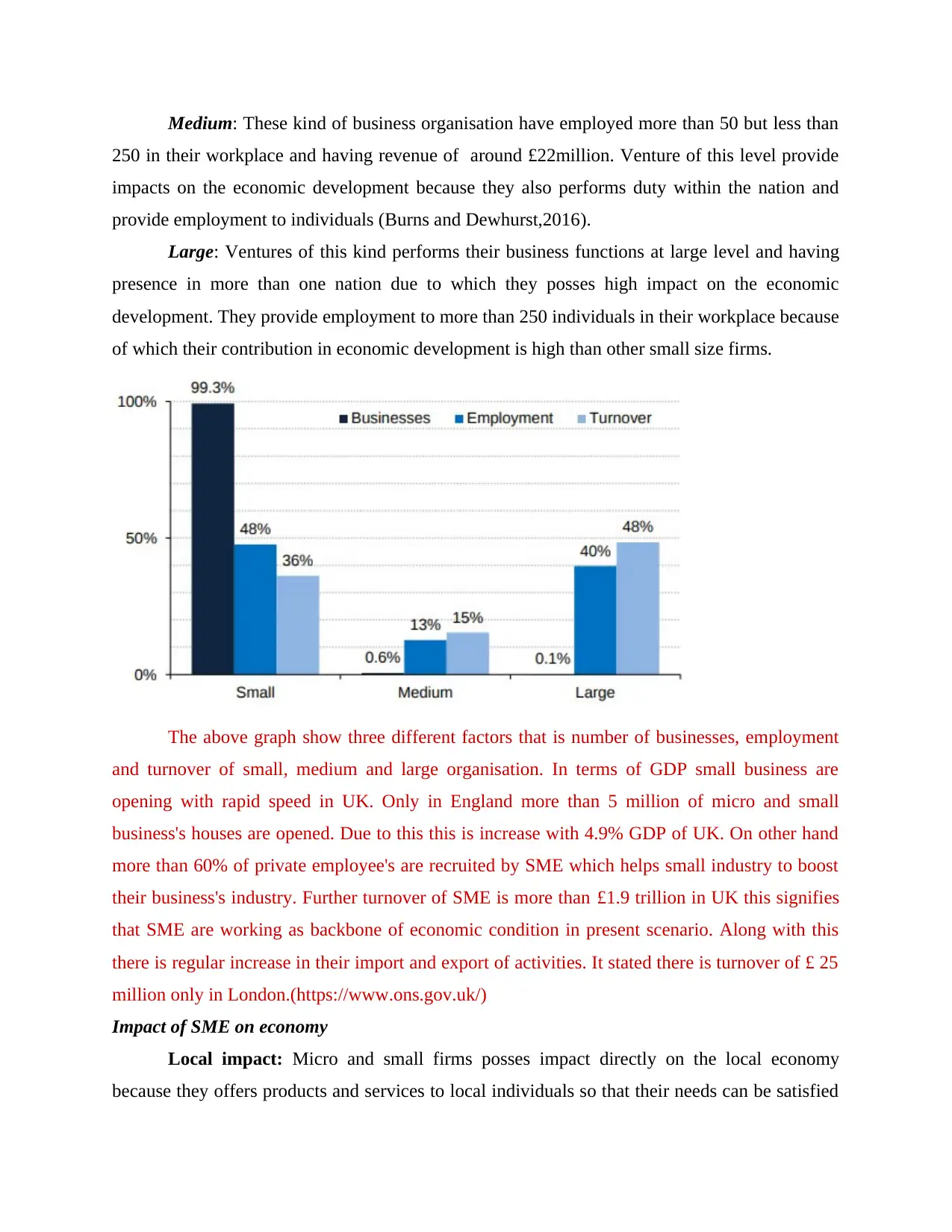
Medium: These kind of business organisation have employed more than 50 but less than
250 in their workplace and having revenue of around £22million. Venture of this level provide
impacts on the economic development because they also performs duty within the nation and
provide employment to individuals (Burns and Dewhurst,2016).
Large: Ventures of this kind performs their business functions at large level and having
presence in more than one nation due to which they posses high impact on the economic
development. They provide employment to more than 250 individuals in their workplace because
of which their contribution in economic development is high than other small size firms.
The above graph show three different factors that is number of businesses, employment
and turnover of small, medium and large organisation. In terms of GDP small business are
opening with rapid speed in UK. Only in England more than 5 million of micro and small
business's houses are opened. Due to this this is increase with 4.9% GDP of UK. On other hand
more than 60% of private employee's are recruited by SME which helps small industry to boost
their business's industry. Further turnover of SME is more than £1.9 trillion in UK this signifies
that SME are working as backbone of economic condition in present scenario. Along with this
there is regular increase in their import and export of activities. It stated there is turnover of £ 25
million only in London.(https://www.ons.gov.uk/)
Impact of SME on economy
Local impact: Micro and small firms posses impact directly on the local economy
because they offers products and services to local individuals so that their needs can be satisfied
250 in their workplace and having revenue of around £22million. Venture of this level provide
impacts on the economic development because they also performs duty within the nation and
provide employment to individuals (Burns and Dewhurst,2016).
Large: Ventures of this kind performs their business functions at large level and having
presence in more than one nation due to which they posses high impact on the economic
development. They provide employment to more than 250 individuals in their workplace because
of which their contribution in economic development is high than other small size firms.
The above graph show three different factors that is number of businesses, employment
and turnover of small, medium and large organisation. In terms of GDP small business are
opening with rapid speed in UK. Only in England more than 5 million of micro and small
business's houses are opened. Due to this this is increase with 4.9% GDP of UK. On other hand
more than 60% of private employee's are recruited by SME which helps small industry to boost
their business's industry. Further turnover of SME is more than £1.9 trillion in UK this signifies
that SME are working as backbone of economic condition in present scenario. Along with this
there is regular increase in their import and export of activities. It stated there is turnover of £ 25
million only in London.(https://www.ons.gov.uk/)
Impact of SME on economy
Local impact: Micro and small firms posses impact directly on the local economy
because they offers products and services to local individuals so that their needs can be satisfied
Paraphrase This Document
Need a fresh take? Get an instant paraphrase of this document with our AI Paraphraser
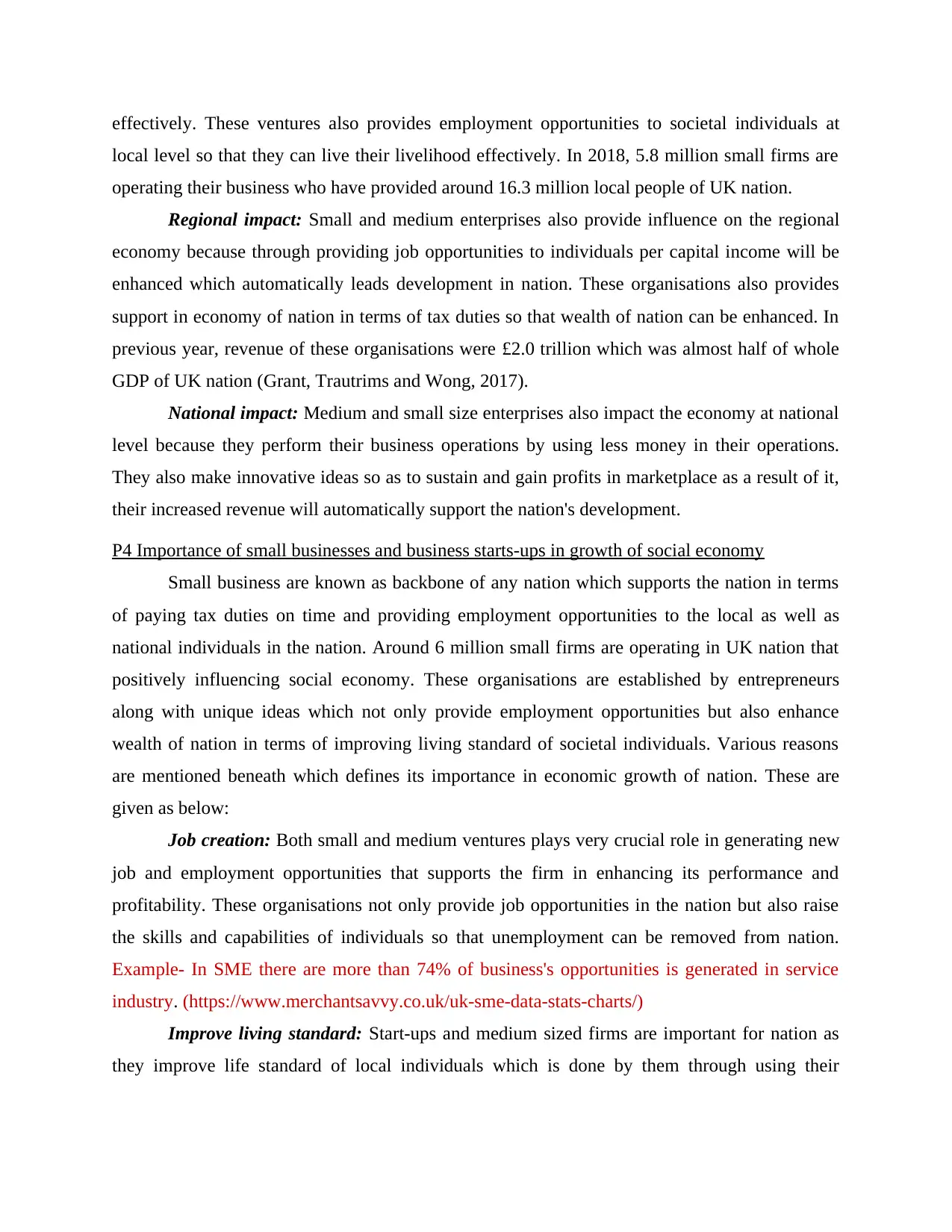
effectively. These ventures also provides employment opportunities to societal individuals at
local level so that they can live their livelihood effectively. In 2018, 5.8 million small firms are
operating their business who have provided around 16.3 million local people of UK nation.
Regional impact: Small and medium enterprises also provide influence on the regional
economy because through providing job opportunities to individuals per capital income will be
enhanced which automatically leads development in nation. These organisations also provides
support in economy of nation in terms of tax duties so that wealth of nation can be enhanced. In
previous year, revenue of these organisations were £2.0 trillion which was almost half of whole
GDP of UK nation (Grant, Trautrims and Wong, 2017).
National impact: Medium and small size enterprises also impact the economy at national
level because they perform their business operations by using less money in their operations.
They also make innovative ideas so as to sustain and gain profits in marketplace as a result of it,
their increased revenue will automatically support the nation's development.
P4 Importance of small businesses and business starts-ups in growth of social economy
Small business are known as backbone of any nation which supports the nation in terms
of paying tax duties on time and providing employment opportunities to the local as well as
national individuals in the nation. Around 6 million small firms are operating in UK nation that
positively influencing social economy. These organisations are established by entrepreneurs
along with unique ideas which not only provide employment opportunities but also enhance
wealth of nation in terms of improving living standard of societal individuals. Various reasons
are mentioned beneath which defines its importance in economic growth of nation. These are
given as below:
Job creation: Both small and medium ventures plays very crucial role in generating new
job and employment opportunities that supports the firm in enhancing its performance and
profitability. These organisations not only provide job opportunities in the nation but also raise
the skills and capabilities of individuals so that unemployment can be removed from nation.
Example- In SME there are more than 74% of business's opportunities is generated in service
industry. (https://www.merchantsavvy.co.uk/uk-sme-data-stats-charts/)
Improve living standard: Start-ups and medium sized firms are important for nation as
they improve life standard of local individuals which is done by them through using their
local level so that they can live their livelihood effectively. In 2018, 5.8 million small firms are
operating their business who have provided around 16.3 million local people of UK nation.
Regional impact: Small and medium enterprises also provide influence on the regional
economy because through providing job opportunities to individuals per capital income will be
enhanced which automatically leads development in nation. These organisations also provides
support in economy of nation in terms of tax duties so that wealth of nation can be enhanced. In
previous year, revenue of these organisations were £2.0 trillion which was almost half of whole
GDP of UK nation (Grant, Trautrims and Wong, 2017).
National impact: Medium and small size enterprises also impact the economy at national
level because they perform their business operations by using less money in their operations.
They also make innovative ideas so as to sustain and gain profits in marketplace as a result of it,
their increased revenue will automatically support the nation's development.
P4 Importance of small businesses and business starts-ups in growth of social economy
Small business are known as backbone of any nation which supports the nation in terms
of paying tax duties on time and providing employment opportunities to the local as well as
national individuals in the nation. Around 6 million small firms are operating in UK nation that
positively influencing social economy. These organisations are established by entrepreneurs
along with unique ideas which not only provide employment opportunities but also enhance
wealth of nation in terms of improving living standard of societal individuals. Various reasons
are mentioned beneath which defines its importance in economic growth of nation. These are
given as below:
Job creation: Both small and medium ventures plays very crucial role in generating new
job and employment opportunities that supports the firm in enhancing its performance and
profitability. These organisations not only provide job opportunities in the nation but also raise
the skills and capabilities of individuals so that unemployment can be removed from nation.
Example- In SME there are more than 74% of business's opportunities is generated in service
industry. (https://www.merchantsavvy.co.uk/uk-sme-data-stats-charts/)
Improve living standard: Start-ups and medium sized firms are important for nation as
they improve life standard of local individuals which is done by them through using their
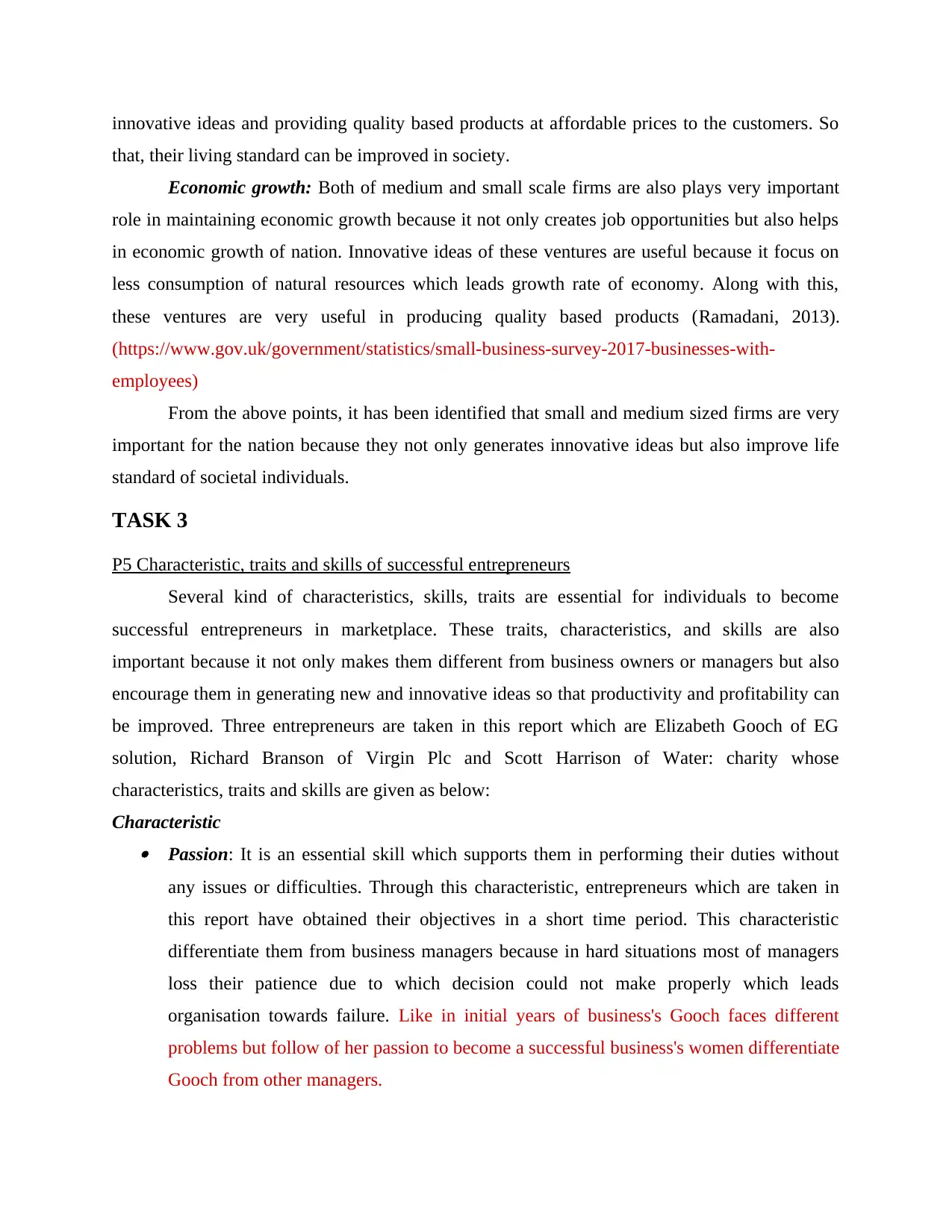
innovative ideas and providing quality based products at affordable prices to the customers. So
that, their living standard can be improved in society.
Economic growth: Both of medium and small scale firms are also plays very important
role in maintaining economic growth because it not only creates job opportunities but also helps
in economic growth of nation. Innovative ideas of these ventures are useful because it focus on
less consumption of natural resources which leads growth rate of economy. Along with this,
these ventures are very useful in producing quality based products (Ramadani, 2013).
(https://www.gov.uk/government/statistics/small-business-survey-2017-businesses-with-
employees)
From the above points, it has been identified that small and medium sized firms are very
important for the nation because they not only generates innovative ideas but also improve life
standard of societal individuals.
TASK 3
P5 Characteristic, traits and skills of successful entrepreneurs
Several kind of characteristics, skills, traits are essential for individuals to become
successful entrepreneurs in marketplace. These traits, characteristics, and skills are also
important because it not only makes them different from business owners or managers but also
encourage them in generating new and innovative ideas so that productivity and profitability can
be improved. Three entrepreneurs are taken in this report which are Elizabeth Gooch of EG
solution, Richard Branson of Virgin Plc and Scott Harrison of Water: charity whose
characteristics, traits and skills are given as below:
Characteristic Passion: It is an essential skill which supports them in performing their duties without
any issues or difficulties. Through this characteristic, entrepreneurs which are taken in
this report have obtained their objectives in a short time period. This characteristic
differentiate them from business managers because in hard situations most of managers
loss their patience due to which decision could not make properly which leads
organisation towards failure. Like in initial years of business's Gooch faces different
problems but follow of her passion to become a successful business's women differentiate
Gooch from other managers.
that, their living standard can be improved in society.
Economic growth: Both of medium and small scale firms are also plays very important
role in maintaining economic growth because it not only creates job opportunities but also helps
in economic growth of nation. Innovative ideas of these ventures are useful because it focus on
less consumption of natural resources which leads growth rate of economy. Along with this,
these ventures are very useful in producing quality based products (Ramadani, 2013).
(https://www.gov.uk/government/statistics/small-business-survey-2017-businesses-with-
employees)
From the above points, it has been identified that small and medium sized firms are very
important for the nation because they not only generates innovative ideas but also improve life
standard of societal individuals.
TASK 3
P5 Characteristic, traits and skills of successful entrepreneurs
Several kind of characteristics, skills, traits are essential for individuals to become
successful entrepreneurs in marketplace. These traits, characteristics, and skills are also
important because it not only makes them different from business owners or managers but also
encourage them in generating new and innovative ideas so that productivity and profitability can
be improved. Three entrepreneurs are taken in this report which are Elizabeth Gooch of EG
solution, Richard Branson of Virgin Plc and Scott Harrison of Water: charity whose
characteristics, traits and skills are given as below:
Characteristic Passion: It is an essential skill which supports them in performing their duties without
any issues or difficulties. Through this characteristic, entrepreneurs which are taken in
this report have obtained their objectives in a short time period. This characteristic
differentiate them from business managers because in hard situations most of managers
loss their patience due to which decision could not make properly which leads
organisation towards failure. Like in initial years of business's Gooch faces different
problems but follow of her passion to become a successful business's women differentiate
Gooch from other managers.
⊘ This is a preview!⊘
Do you want full access?
Subscribe today to unlock all pages.

Trusted by 1+ million students worldwide
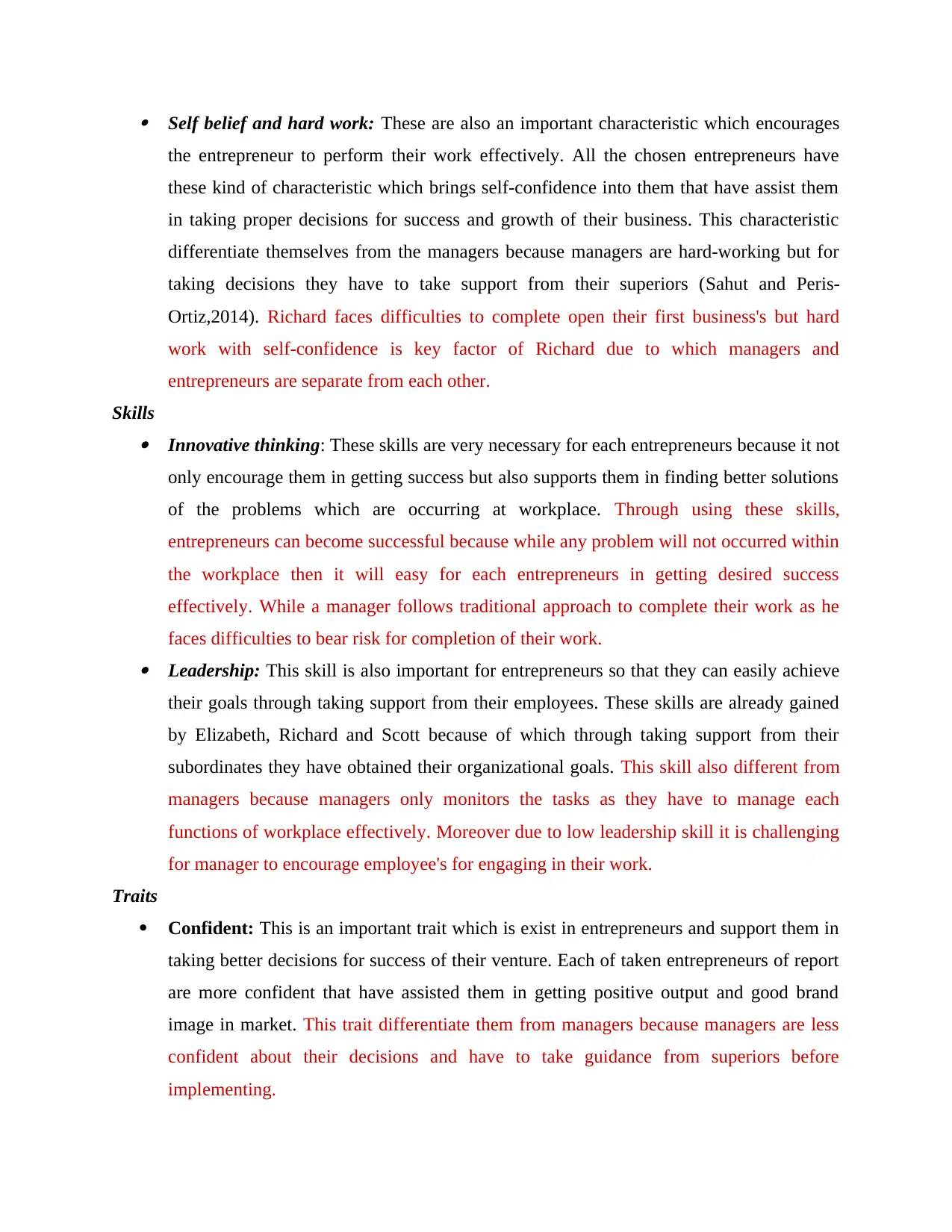
Self belief and hard work: These are also an important characteristic which encourages
the entrepreneur to perform their work effectively. All the chosen entrepreneurs have
these kind of characteristic which brings self-confidence into them that have assist them
in taking proper decisions for success and growth of their business. This characteristic
differentiate themselves from the managers because managers are hard-working but for
taking decisions they have to take support from their superiors (Sahut and Peris-
Ortiz,2014). Richard faces difficulties to complete open their first business's but hard
work with self-confidence is key factor of Richard due to which managers and
entrepreneurs are separate from each other.
Skills Innovative thinking: These skills are very necessary for each entrepreneurs because it not
only encourage them in getting success but also supports them in finding better solutions
of the problems which are occurring at workplace. Through using these skills,
entrepreneurs can become successful because while any problem will not occurred within
the workplace then it will easy for each entrepreneurs in getting desired success
effectively. While a manager follows traditional approach to complete their work as he
faces difficulties to bear risk for completion of their work. Leadership: This skill is also important for entrepreneurs so that they can easily achieve
their goals through taking support from their employees. These skills are already gained
by Elizabeth, Richard and Scott because of which through taking support from their
subordinates they have obtained their organizational goals. This skill also different from
managers because managers only monitors the tasks as they have to manage each
functions of workplace effectively. Moreover due to low leadership skill it is challenging
for manager to encourage employee's for engaging in their work.
Traits
Confident: This is an important trait which is exist in entrepreneurs and support them in
taking better decisions for success of their venture. Each of taken entrepreneurs of report
are more confident that have assisted them in getting positive output and good brand
image in market. This trait differentiate them from managers because managers are less
confident about their decisions and have to take guidance from superiors before
implementing.
the entrepreneur to perform their work effectively. All the chosen entrepreneurs have
these kind of characteristic which brings self-confidence into them that have assist them
in taking proper decisions for success and growth of their business. This characteristic
differentiate themselves from the managers because managers are hard-working but for
taking decisions they have to take support from their superiors (Sahut and Peris-
Ortiz,2014). Richard faces difficulties to complete open their first business's but hard
work with self-confidence is key factor of Richard due to which managers and
entrepreneurs are separate from each other.
Skills Innovative thinking: These skills are very necessary for each entrepreneurs because it not
only encourage them in getting success but also supports them in finding better solutions
of the problems which are occurring at workplace. Through using these skills,
entrepreneurs can become successful because while any problem will not occurred within
the workplace then it will easy for each entrepreneurs in getting desired success
effectively. While a manager follows traditional approach to complete their work as he
faces difficulties to bear risk for completion of their work. Leadership: This skill is also important for entrepreneurs so that they can easily achieve
their goals through taking support from their employees. These skills are already gained
by Elizabeth, Richard and Scott because of which through taking support from their
subordinates they have obtained their organizational goals. This skill also different from
managers because managers only monitors the tasks as they have to manage each
functions of workplace effectively. Moreover due to low leadership skill it is challenging
for manager to encourage employee's for engaging in their work.
Traits
Confident: This is an important trait which is exist in entrepreneurs and support them in
taking better decisions for success of their venture. Each of taken entrepreneurs of report
are more confident that have assisted them in getting positive output and good brand
image in market. This trait differentiate them from managers because managers are less
confident about their decisions and have to take guidance from superiors before
implementing.
Paraphrase This Document
Need a fresh take? Get an instant paraphrase of this document with our AI Paraphraser
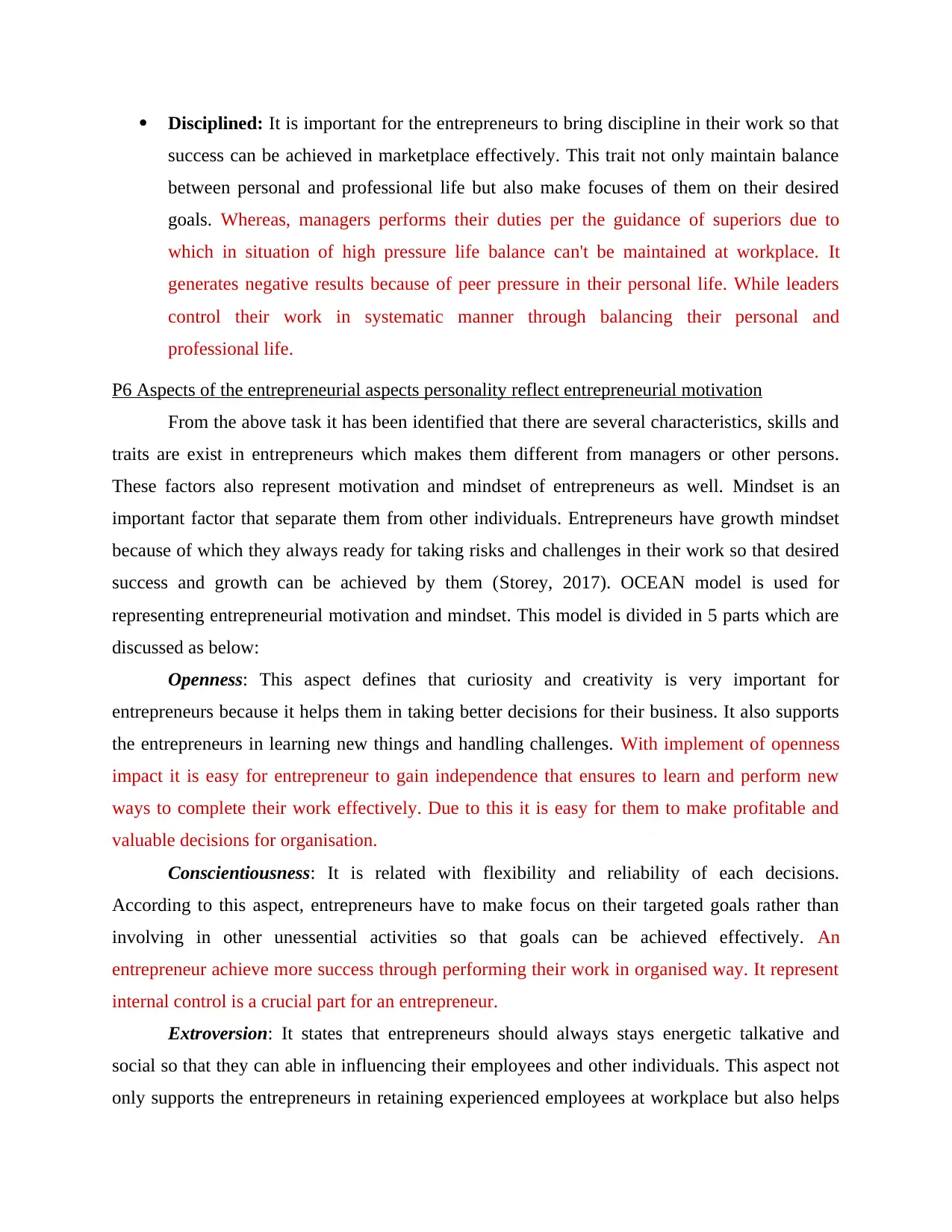
Disciplined: It is important for the entrepreneurs to bring discipline in their work so that
success can be achieved in marketplace effectively. This trait not only maintain balance
between personal and professional life but also make focuses of them on their desired
goals. Whereas, managers performs their duties per the guidance of superiors due to
which in situation of high pressure life balance can't be maintained at workplace. It
generates negative results because of peer pressure in their personal life. While leaders
control their work in systematic manner through balancing their personal and
professional life.
P6 Aspects of the entrepreneurial aspects personality reflect entrepreneurial motivation
From the above task it has been identified that there are several characteristics, skills and
traits are exist in entrepreneurs which makes them different from managers or other persons.
These factors also represent motivation and mindset of entrepreneurs as well. Mindset is an
important factor that separate them from other individuals. Entrepreneurs have growth mindset
because of which they always ready for taking risks and challenges in their work so that desired
success and growth can be achieved by them (Storey, 2017). OCEAN model is used for
representing entrepreneurial motivation and mindset. This model is divided in 5 parts which are
discussed as below:
Openness: This aspect defines that curiosity and creativity is very important for
entrepreneurs because it helps them in taking better decisions for their business. It also supports
the entrepreneurs in learning new things and handling challenges. With implement of openness
impact it is easy for entrepreneur to gain independence that ensures to learn and perform new
ways to complete their work effectively. Due to this it is easy for them to make profitable and
valuable decisions for organisation.
Conscientiousness: It is related with flexibility and reliability of each decisions.
According to this aspect, entrepreneurs have to make focus on their targeted goals rather than
involving in other unessential activities so that goals can be achieved effectively. An
entrepreneur achieve more success through performing their work in organised way. It represent
internal control is a crucial part for an entrepreneur.
Extroversion: It states that entrepreneurs should always stays energetic talkative and
social so that they can able in influencing their employees and other individuals. This aspect not
only supports the entrepreneurs in retaining experienced employees at workplace but also helps
success can be achieved in marketplace effectively. This trait not only maintain balance
between personal and professional life but also make focuses of them on their desired
goals. Whereas, managers performs their duties per the guidance of superiors due to
which in situation of high pressure life balance can't be maintained at workplace. It
generates negative results because of peer pressure in their personal life. While leaders
control their work in systematic manner through balancing their personal and
professional life.
P6 Aspects of the entrepreneurial aspects personality reflect entrepreneurial motivation
From the above task it has been identified that there are several characteristics, skills and
traits are exist in entrepreneurs which makes them different from managers or other persons.
These factors also represent motivation and mindset of entrepreneurs as well. Mindset is an
important factor that separate them from other individuals. Entrepreneurs have growth mindset
because of which they always ready for taking risks and challenges in their work so that desired
success and growth can be achieved by them (Storey, 2017). OCEAN model is used for
representing entrepreneurial motivation and mindset. This model is divided in 5 parts which are
discussed as below:
Openness: This aspect defines that curiosity and creativity is very important for
entrepreneurs because it helps them in taking better decisions for their business. It also supports
the entrepreneurs in learning new things and handling challenges. With implement of openness
impact it is easy for entrepreneur to gain independence that ensures to learn and perform new
ways to complete their work effectively. Due to this it is easy for them to make profitable and
valuable decisions for organisation.
Conscientiousness: It is related with flexibility and reliability of each decisions.
According to this aspect, entrepreneurs have to make focus on their targeted goals rather than
involving in other unessential activities so that goals can be achieved effectively. An
entrepreneur achieve more success through performing their work in organised way. It represent
internal control is a crucial part for an entrepreneur.
Extroversion: It states that entrepreneurs should always stays energetic talkative and
social so that they can able in influencing their employees and other individuals. This aspect not
only supports the entrepreneurs in retaining experienced employees at workplace but also helps
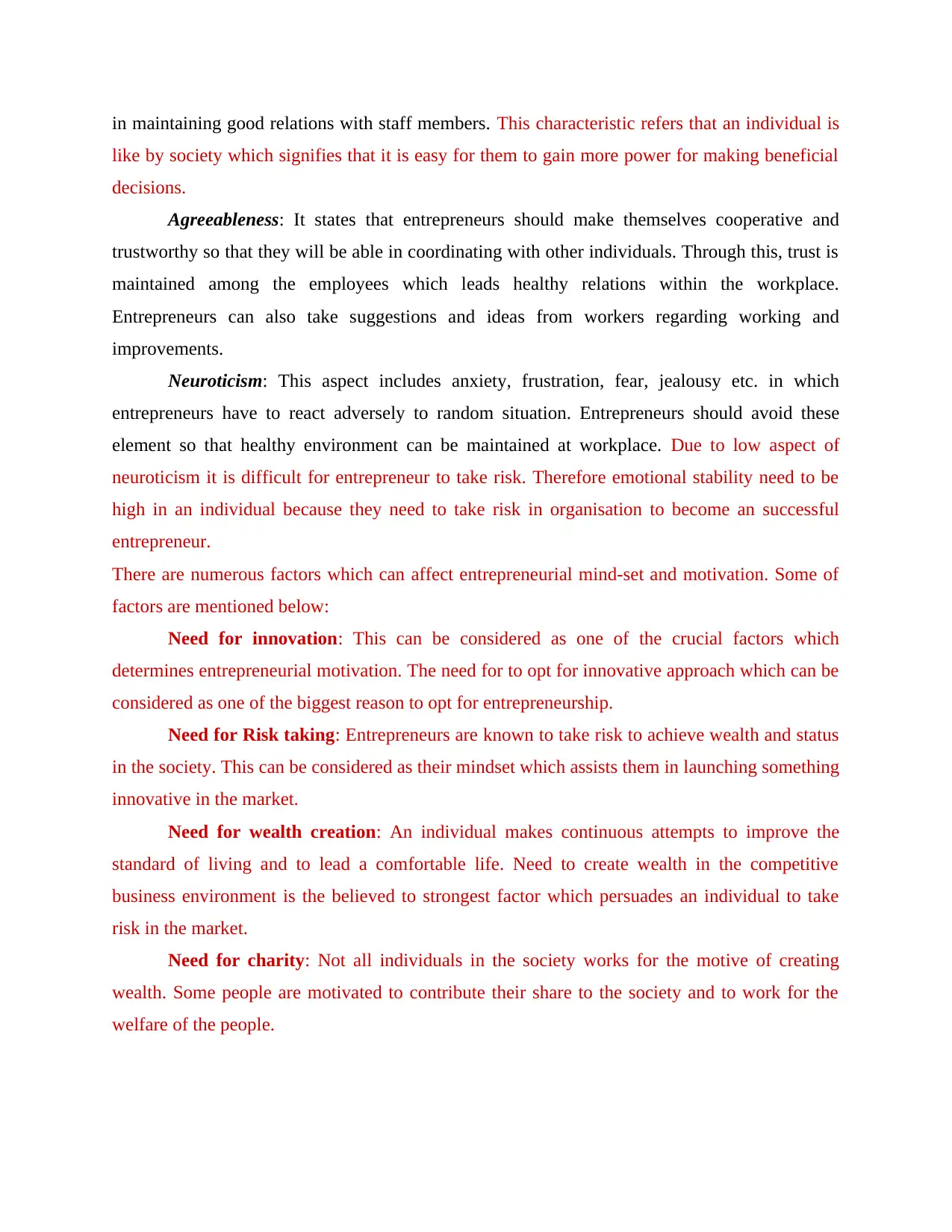
in maintaining good relations with staff members. This characteristic refers that an individual is
like by society which signifies that it is easy for them to gain more power for making beneficial
decisions.
Agreeableness: It states that entrepreneurs should make themselves cooperative and
trustworthy so that they will be able in coordinating with other individuals. Through this, trust is
maintained among the employees which leads healthy relations within the workplace.
Entrepreneurs can also take suggestions and ideas from workers regarding working and
improvements.
Neuroticism: This aspect includes anxiety, frustration, fear, jealousy etc. in which
entrepreneurs have to react adversely to random situation. Entrepreneurs should avoid these
element so that healthy environment can be maintained at workplace. Due to low aspect of
neuroticism it is difficult for entrepreneur to take risk. Therefore emotional stability need to be
high in an individual because they need to take risk in organisation to become an successful
entrepreneur.
There are numerous factors which can affect entrepreneurial mind-set and motivation. Some of
factors are mentioned below:
Need for innovation: This can be considered as one of the crucial factors which
determines entrepreneurial motivation. The need for to opt for innovative approach which can be
considered as one of the biggest reason to opt for entrepreneurship.
Need for Risk taking: Entrepreneurs are known to take risk to achieve wealth and status
in the society. This can be considered as their mindset which assists them in launching something
innovative in the market.
Need for wealth creation: An individual makes continuous attempts to improve the
standard of living and to lead a comfortable life. Need to create wealth in the competitive
business environment is the believed to strongest factor which persuades an individual to take
risk in the market.
Need for charity: Not all individuals in the society works for the motive of creating
wealth. Some people are motivated to contribute their share to the society and to work for the
welfare of the people.
like by society which signifies that it is easy for them to gain more power for making beneficial
decisions.
Agreeableness: It states that entrepreneurs should make themselves cooperative and
trustworthy so that they will be able in coordinating with other individuals. Through this, trust is
maintained among the employees which leads healthy relations within the workplace.
Entrepreneurs can also take suggestions and ideas from workers regarding working and
improvements.
Neuroticism: This aspect includes anxiety, frustration, fear, jealousy etc. in which
entrepreneurs have to react adversely to random situation. Entrepreneurs should avoid these
element so that healthy environment can be maintained at workplace. Due to low aspect of
neuroticism it is difficult for entrepreneur to take risk. Therefore emotional stability need to be
high in an individual because they need to take risk in organisation to become an successful
entrepreneur.
There are numerous factors which can affect entrepreneurial mind-set and motivation. Some of
factors are mentioned below:
Need for innovation: This can be considered as one of the crucial factors which
determines entrepreneurial motivation. The need for to opt for innovative approach which can be
considered as one of the biggest reason to opt for entrepreneurship.
Need for Risk taking: Entrepreneurs are known to take risk to achieve wealth and status
in the society. This can be considered as their mindset which assists them in launching something
innovative in the market.
Need for wealth creation: An individual makes continuous attempts to improve the
standard of living and to lead a comfortable life. Need to create wealth in the competitive
business environment is the believed to strongest factor which persuades an individual to take
risk in the market.
Need for charity: Not all individuals in the society works for the motive of creating
wealth. Some people are motivated to contribute their share to the society and to work for the
welfare of the people.
⊘ This is a preview!⊘
Do you want full access?
Subscribe today to unlock all pages.

Trusted by 1+ million students worldwide
1 out of 15
Related Documents
Your All-in-One AI-Powered Toolkit for Academic Success.
+13062052269
info@desklib.com
Available 24*7 on WhatsApp / Email
![[object Object]](/_next/static/media/star-bottom.7253800d.svg)
Unlock your academic potential
Copyright © 2020–2026 A2Z Services. All Rights Reserved. Developed and managed by ZUCOL.





